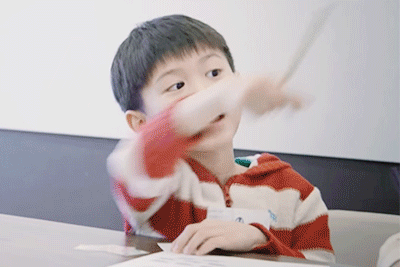
New year, new school, new opportunities for growth! Read our article as we share some tried and true tips for parents and children in the lead up to the first day of primary school.
A Whole New World Awaits
New classmates, new teachers, new school environment — your child’s tiny world is about to get a lot bigger. With these changes come opportunities for personal, social and cognitive growth.
The Countdown And Preparation Begins
In these weeks as you count down to your child’s first day of school, you may be wondering, “What will school be like for my child? Will my child be able to cope in the new environment?”
Parents can help by being proactive — research from professionals at Duke University suggests that establishing a strong communication channel with your child’s teachers helps and so does monitoring changes in your child's behaviour or mood when he or she first starts school.
Whether at home or in school, we’ve got some great tips for every stage of preparation that will help you (and your child) pave a smooth journey towards the new school term in January.
1. Create A Routine That Works
Studies have shown that routines help children feel safe and secure. Set up a routine that works for your child — whether it’s a shower before dinner or an afternoon snack before naptime, it’s important that your child gets into a routine that he or she is comfortable with.
2. Identify Friendly Figures In School
Helping your child identify teachers or staff he or she can go to for assistance is important. When your child recognises trustworthy figures of authority, he or she will feel more secure in the new environment.
Related Article: Gear Up For Primary 1
3. Prepare An 'Emergency' Fund
You may want to consider setting aside an “emergency fund” for your child. Placing extra money in a separate wallet or purse to be kept in his or her school bag means that your child will still have access to money if he or she misplaces pocket money. However, you should set some strict rules about when this money can be used.
4. Test Out That Transport Route
It may be a good idea to have a few dry runs of your child’s journey to and from school to help your child familiarise himself or herself with the route. Help your child identify key landmarks and remember the specific place where he or she will be dropped off or picked up from everyday.
Related Article: Raising A Responsible Child
5. Set Mini Goals To Achieve Together
Help to make the experience seem less daunting by setting mini goals for the first day of school. Start with small tasks like “Leave the house on time” or “Remember to bring my water bottle home” or “Meet one new friend in class today”. These mini goals give your child something to look forward to on his or her first day of school!
Download Our Special Guide To Surviving And Thriving In Primary 1
The Learning Lab would like to extend our help as you and your child are preparing for Primary 1 and the new adventures that lie ahead. Download our fun and informative guide filled with 25 great tips to help your child survive and thrive in Primary 1!
Children thrive on positive reinforcement. As a parent, it is important to maintain your child’s favourable qualities and behaviours with constant communication and celebrate what makes him or her unique.
Children navigate the world through sensing, observing and experiencing everything around them. What we, as adults, show and tell them will shape the person that they become. This is why it is important to help your child build a positive perception of his or her skills, abilities and uniqueness through fulfilling and nurturing ways.

It is not unusual to feel that Singapore's competitive education culture can push and pressure children over their limits until they detest learning and see it as a boring and arduous chore.
This sentiment is shared by Dr. Goh Kah Hong, Head of Psychology at Khoo Teck Puat Hospital, who has observed that "our children are facing high academic stress resulting in anxiety and depression”.
On top of this immense pressure, many children are also subjected to comparisons between their siblings, cousins, schoolmates and peers — a sad and dangerous tendency for well-meaning Singaporean parents who want only the best for their children.
Our team at The Learning Lab wants to change this. We aim to place emphasis on our students’ behavioural development and social skills, as much as we aim to bring joy to their learning experiences. Read on to find out how you too can create an emotionally safe and loving environment for your young learner.

1. Demonstrate Self-Love and Positive Self-Talk
Self-love is acceptance and kindness towards one’s self. It’s a recognition of our own unique qualities and taking pride in those qualities.
We tend to feel sorry for ourselves and we blame ourselves out loud when we are stressed or when we make mistakes. We say things like, “I’m not good enough,” or, “Why would anyone do that to me?”
Unhealthy statements like these have psychological effects on the person saying it as much as the people who are around to listen to it. And because children are naturally intuitive, they pick up on these pretty quickly.
It has been widely observed that the mental health and behavioural attitudes of parents have significantly predicted self-esteem as the children grew up.
How can you demonstrate self-love and positive self-talk to your child?
First things first, be mindful. This simply means being aware of thoughts, emotions, words, actions and reactions.
Teach your child positive self-talk by helping him or her to recognise his or her own failures as learning experiences rather than a non-success or a non-fulfilment. Even when your child feels defeated, encourage him or her to practise saying out loud: “That was a good lesson,” or “Now I know better,” or “This experience will be helpful in the future.”
Recognising small wins and celebrating consistent efforts is important.

2. Aim to Be "Better", Not "the Best"
Aiming for “the best” creates a lot of pressure in children and in students. This pressure is counterproductive to their learning as well as their academic performance. The good news? Your child can always aim to be “better”.
Teach your child not to compete with others but to take on challenges.
This can even be something simple like encouraging your child to swing from the start to the end of the monkey bars at a playground. Remember that a little goes a long way.
Reinforce the idea that all tasks should be accomplished with as much enjoyment, enthusiasm and learning as possible, instead of competition, superiority or the illusion of glory.
Show genuine interest in your child’s efforts, offer support during the process and use reassuring phrases like, “You’re doing so well now, remember how you started?” or “How did you do that?” or “No matter what happens, I love you."

3. Ask, Don't Tell
Children are naturally inquisitive. When they ask questions or seek guidance in other ways (e.g. demanding attention), it is important for adults to teach them without making them feel small or incapable.
So instead of telling them what to do, giving orders or making demands, try asking your child for a change.
If your child is upset over something, you can ask: “Do you want to talk?” rather than saying, “Stop sulking” which devalues his or her emotions.
If your child insists on doing something you find uncomfortable, you can ask: “I want to understand why you want to do X” or “Can we compromise and find an alternative to X?” instead of than saying, “I already told you not to do that.''
If you want to follow-up on a task like homework, for instance; you can ask, “How is it going with your Maths homework? Do you need help?” as opposed to saying, “You have to do your Maths homework now”.
By being understanding and respectful, you are able to negotiate and discuss ideas with your child in a healthier way. This encourages conversations that forge stronger bonds between parent and child.

4. Allow Freedom of Expression
Childhood is a precious and fleeting moment. Let your child live it and enjoy it the way he or she deems fit.
Allow your son or your daughter to let loose, run, jump, play, and be silly while providing plenty of opportunities for new experiences, independent exploration and unstructured play.
When a child feels that only performing as well as parents is good enough, that unrealistic standard may discourage effort. A child striving to meet advanced age expectations can also result in them having low confidence.
Additionally, your child also will have his or her own traits, quirks and various methods of expression. These too should be embraced as part of what makes your child unique and special.

5. Keep Your Child Curious and Confident in the Real World
Confidence in the virtual world (although nowadays important) is not the same as real-world confidence that offline effectiveness brings.
More and more children are using social media platforms like Facebook, Instagram, Snapchat, WhatsApp, Twitter and Youtube to connect with others. Prolonged usage may result in them being disengaged and and detached from real-world connections and interactions.
Limit your child’s interaction with the virtual world and encourage him or her to build human connections in person by organising age-appropriate events or simply taking trips to the park, playground and other social environments.
Fun extracurricular activities, such as martial arts classes, music lessons or dance sessions also open up social opportunities for children while they acquire new skills and build up their self-esteem.

Providing Fulfilling Life Lessons
By building your child’s confidence, positivity and individual self-expression, you are contributing to his or her emotional intelligence, optimistic outlook on life and openness to take on the challenges ahead.
At The Learning Lab, we also strive along with parents in providing a nurturing and well-rounded learning experience for our students.
We build on our students’ confidence, positivity and individuality through classes that allow them to work, think and act independently.
By providing ample opportunities for our students to learn, explore and grow, we believe that they will gain many valuable life lessons that will equip them for the future.
In fact, we stayed in contact with many former students and are heartened to know how many of them, to this day, continue to express their appreciation for our passionate teachers who provided the stepping stones for them to progress both academically and personally.
“The Learning Lab is more than just an enrichment centre — it is an established institution that has shaped me into the person I am proud to be today,” our former student, Kate Lim eloquently testified. “The culture of the place is that of reverence — respect for the teachers, the learning and the environment.”
“Every Saturday, my English teacher would bring us through a repertoire of enticing materials. There was a liberating sense of freedom in her classroom that I treasure deeply,” she added.
“Every input was valued and considered, and everyone felt safe contributing to an invigorating discussion. My English teacher’s surfeit of knowledge and prodigious wisdom on the world still inspires me today.”
You can find out more about our supportive culture through our students’ personal accounts here.
The Learning Lab is now at locations. Find a location that suits your needs.
If you have any questions about our range of programmes or class schedules, you may fill in the form below or contact us at 6733 8711 / enquiry@thelearninglab.com.sg.

